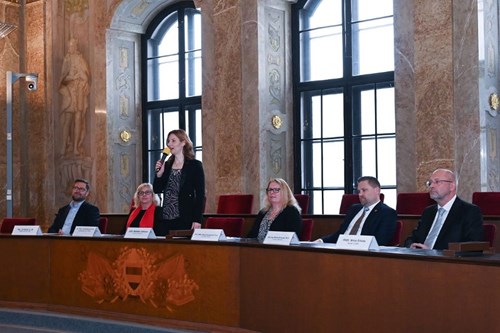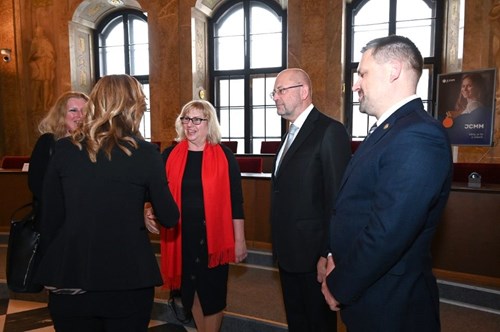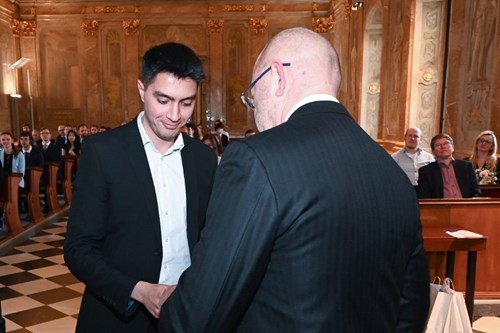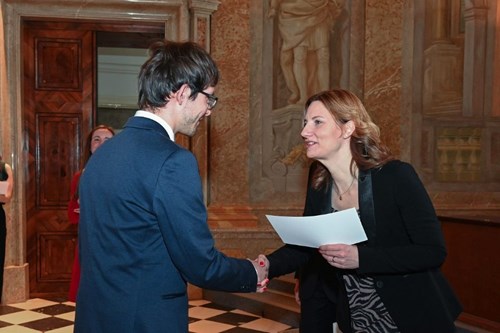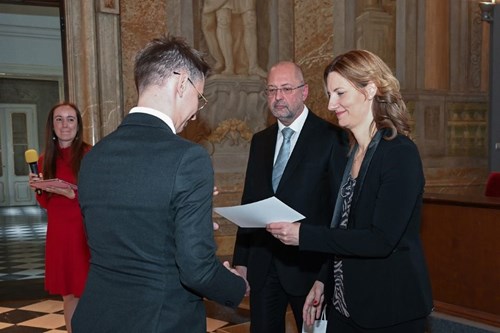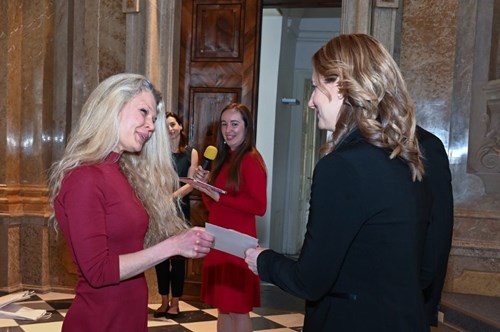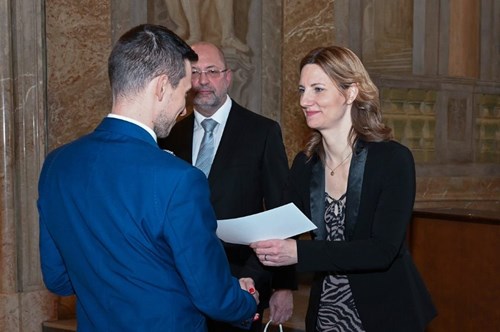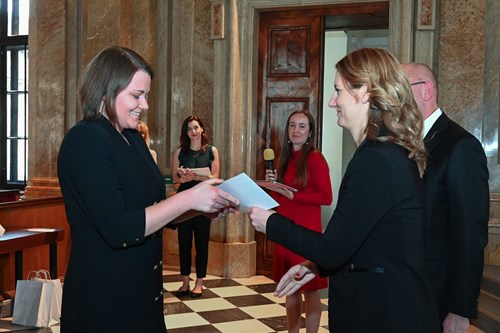
Seven Doctoral Students from FM MU Received the Brno PhD Talent Award
The 11th year of the Brno Ph.D. Talent programme was interesting with the high participation of our students. Fourteen students from Masaryk University were awarded, seven of them from the Faculty of Medicine of Masaryk University.

Seven promising young students from the MU Faculty of Medicine succeeded in the Brno PhD Talent competition. A total of 145 students in the first year of doctoral programmes at Brno universities entered the 11th year of the competition. Like every year, a jury of top Czech and international scientists selected 25 finalists, fourteen of whom represented Masaryk University in the shortlist. The interest in the prestigious competition is confirmed by the increase in the number of applications. In the previous year, 130 applications were submitted.
The aim of the Brno PhD Talent is to support scientific research and young scientists whose projects are linked to South Moravia and Brno, and also to prevent talent from leaving for the private sector. "Since its beginning, the programme has supported more than 230 high-quality scientific teams, significantly helped many young scientists at the beginning of their professional careers and supported research activities that go beyond the Brno region and South Moravia," said Brno Mayor JUDr. Markéta Vaňková during the ceremony, which took place in the Knights' Hall of the New Town Hall in Brno on 15th March 2022.
Who received the award from FM MU?
Between the awarded, there were student of Biomedical Sciences Jakub Sumbal, Yusuf Lodhi, Volodymyr Porokh, Matea Brezak, Vincent Jongen a Karolína Smolková and a student of Neurosciences Zita Goliášová.
Jakub Sumbal: Fibroblast-intrinsic FGF, WNT and NOTCH signaling in mammary epithelial morphogenesis
How organs are formed is a fundamental question of developmental biology. Signals from the surrounding microenvironment are important controls for the developing organ, and similar growth-promoting signals can be exploited by a growing tumor. Dr. Sumbal is trying to determine how three signaling pathways (called FGF, WNT and NOTCH) regulate the biology of fibroblasts - the main cells of the microenvironment of growing organs.
Yusuf Lodhi: Identification of novel means to overcome resistance to Venetoclax in AML
Acute myeloid leukemia (AML) is a disease with a low survival probability and limited treatment options, relying primarily on chemotherapy. Venetoclax is a promising new BCL-2 inhibitor efficacy of which suffers from resistance. Using drug profiling and CRISPR/Cas9 screening, we are identifying drugs capable of synergizing with venetoclax or reversing its resistance. This may reveal unique targets for new effective targeted therapies and to achieve more potent responses compared to Venetoclax alone.
Volodymyr Porokh: Molecular mechanisms determining genetic (in)stability in the mammalian zygote
Despite scientific advances in reproductive medicine, the development of the embryo is still shrouded in mystery. The way in which the cell cycle mechanism is altered to allow the union and segregation of the two parental genomes in the fertilized egg is fundamental to all mammals. The proposed work will shed light on how fundamental cell cycle mechanisms are adapted during the transition from acentrosomal female meiosis to mitotic division, in which centrioles from the male gamete take control of microtubule organization.
Matea Brezak: Decoding ERK signalling patterns underlying physiological and cancerous cell behaviour
Understanding the underlying cellular mechanisms behind mammary gland development and changes in cancer is essential for the development of new therapies for breast cancer patients. ERK is a major signaling node associated with different cell behaviors in normal development and in cancer. My research will use advanced biosensor systems, 3D organoid cultures, state-of-the-art imaging, and molecular biology techniques to investigate ERK associated with breast development and cancer initiation and progression.
Vincent Jongen: Development of microfluidic systems for the modelling of lung tissue
Advances in stem cell research have led to the development of 3D in vitro models or organoids. While organoids allow partial recapitulation of some aspects of lung tissue, significant limitations remain (e.g. lack of tissue architecture or concentration gradients of signaling molecules). This project aims to develop a microfluidic device that combines lung and endothelial progenitors to overcome these challenges and control lung tissue morphogenesis in a controlled microenvironment.
Zita Goliášová: The function of microRNA in the epileptic brain
Temporal lobe epilepsy is one of the most common types of epileptic seizures, characterized by strong drug resistance, which makes its treatment very complicated. The aim of my project is to clarify the mechanisms that influence epileptic seizure onset at the molecular level. Specifically, I am looking at the action of microRNAs, the level fluctuations of which have a major impact on neuronal excitability. Unraveling the function and specific targets of microRNAs would contribute significantly to the treatment of this disease.
Karolína Smolková: Targeting the eIF4F complex to overcome melanoma resistance to BRAF and MEK inhibitors
Malignant melanoma is an aggressive cancer growth, which is driven by oncogenic mutations that hyperactivate the ERK signaling pathway. Members of this pathway are targeted by highly potent inhibitors. However, resistance soon sets in and the disease unfortunately returns. As part of my project, I am looking to further understand the mechanisms behind the emergence of resistance, in particular the link between ERK signalling and increased activity of the eIF4F complex. My project also aims to identify and characterise novel inhibitors of this complex.
What does "science" mean to the awarded students?
Doctoral studies at FM MU are among the most prestigious and the best at MU and in the Czech Republic thanks to the cooperation and efforts of the faculty management, doctoral boards, supervisors, and students themselves. The task of a doctoral student is not only to develop in the field of self-education but also to conduct their own research work. What does science bring to the awarded students from our faculty?
"Science and research greatly influence how today's society lives. The fact that the main job of a scientist is to be curious and to try to approach previously unanswered questions was crucial for my professional decision-making," says Volodymyr Porokh.
"I have always been very close to biology, which is one of the main scientific fields. I like the fact that it allows me to see behind-the-scenes mechanisms underlying the functioning of all organisms, including ourselves. I can then put that knowledge into practice and maybe one day help someone. At the same time, science raises countless interesting questions and offers many challenges that can continuously move our society forward," says Zita Goliášová.
"Science offers various challenges that push me further and allow me to improve my skills. It is not monotonous and allows (and requires) creativity. With its international dimension, it encourages travel and doesn't let you forget foreign languages. And I have quite wandering shoes, and I enjoy several-month internship trips abroad, where I can pick up not only important professional experience but also smaller or bigger pieces of the culture," adds Karolína Smolková.
What is Brno PhD Talent about?
Brno Ph.D. Talent is a competition for PhD students in their first year (1st and 2nd semester) of scientific or engineering fields at Brno's four universities. Students can receive financial support in the amount of 100,000 CZK per year for three years. Each year, 25 scientists aged up to 32 are selected to convince an expert committee of the uniqueness of their scientific projects and the results achieved so far. This project is organised by the JCMM and financially supported as part of the Regional Innovation Strategy of the City of Brno with a grant of 9 million CZK. The whole competition is conducted in English.
